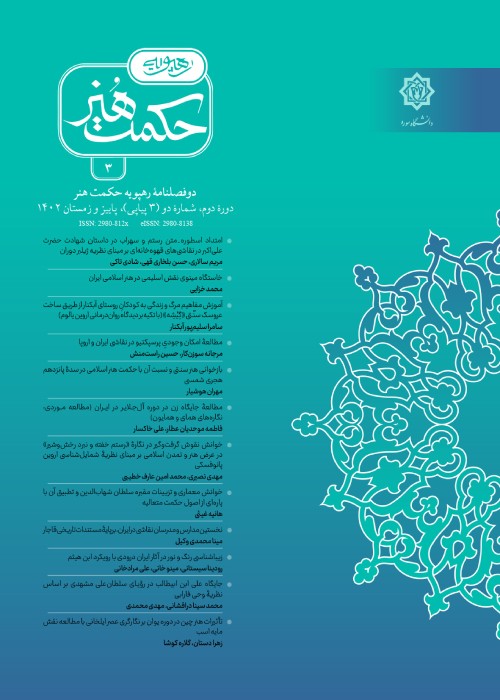The interaction of form and content (words and meaning) in the emergence of beauty and literary criticism based on that interaction in ‘Fotouhat’ ‘Ibn-Arabi’
Author(s):
Article Type:
Research/Original Article (بدون رتبه معتبر)
Abstract:
We went through the Fotouhat book and scrutinized it, having this question in mind whether the relation between form and content or word and meaning and also the way they interact with each other, has been a matter of consideration for Ibn-Arabi or not. Additionally, assuming that it has been a matter of consideration for him and he has had a specific point of view, whether he has criticized a literary work based on his point of view or not? We came across some pages in this book intrusively, in which our two concerns have been addressed with a ‘yes’ answer. The gist of his elaborate answer to our first question is that the beauty of an artistic work has two scopes: Presential Scope and Epiphanic Scope. Regarding the presence, this beauty does not have something to do with words or meaning or a combination of them. However, this is related to the essence of that artistic work which is derived from the presential scope and joined to the truth of the beauty of the world of being, every artistic work is the emergence of that truth and simultaneously signifies the brilliance and coverage of that emergence. Now, artistic work is a pure indicator of that beauty. Therefore, this emergence of beauty can be named ‘goodness and virtue’.This goodness is achieved due to a combination of pure word and prodigious meaning. Furthermore, this combination is a mystery which can indulge the viewers of this work from living everyday life in their ‘worldly-nest’ and draw them close to the scope of the truth of beauty and truthful beauty. Then, he begins to criticize a piece of the romantic poem based on this two-scope beauty.We went through the Fotouhat book and scrutinized it, having this question in mind whether the relation between form and content or word and meaning and also the way they interact with each other, has been a matter of consideration for Ibn-Arabi or not. Additionally, assuming that it has been a matter of consideration for him and he has had a specific point of view, whether he has criticized a literary work based on his point of view or not? We came across some pages in this book intrusively, in which our two concerns have been addressed with a ‘yes’ answer. The gist of his elaborate answer to our first question is that the beauty of an artistic work has two scopes: Presential Scope and Epiphanic Scope. Regarding the presence, this beauty does not have something to do with words or meaning or a combination of them. However, this is related to the essence of that artistic work which is derived from the presential scope and joined to the truth of the beauty of the world of being, every artistic work is the emergence of that truth and simultaneously signifies the brilliance and coverage of that emergence. Now, artistic work is a pure indicator of that beauty. Therefore, this emergence of beauty can be named ‘goodness and virtue’.This goodness is achieved due to a combination of pure word and prodigious meaning. Furthermore, this combination is a mystery which can indulge the viewers of this work from living everyday life in their ‘worldly-nest’ and draw them close to the scope of the truth of beauty and truthful beauty. Then, he begins to criticize a piece of the romantic poem based on this two-scope beauty.
Keywords:
literary work , Words , Meanings , Beauty , presence , Emergence , Art Criticism
Language:
Persian
Published:
Journal of Rahppoye, Hekmat-e Honar, Volume:1 Issue: 1, 2022
Pages:
17 to 25
magiran.com/p2519492
دانلود و مطالعه متن این مقاله با یکی از روشهای زیر امکان پذیر است:
اشتراک شخصی
با عضویت و پرداخت آنلاین حق اشتراک یکساله به مبلغ 1,390,000ريال میتوانید 70 عنوان مطلب دانلود کنید!
اشتراک سازمانی
به کتابخانه دانشگاه یا محل کار خود پیشنهاد کنید تا اشتراک سازمانی این پایگاه را برای دسترسی نامحدود همه کاربران به متن مطالب تهیه نمایند!
توجه!
- حق عضویت دریافتی صرف حمایت از نشریات عضو و نگهداری، تکمیل و توسعه مگیران میشود.
- پرداخت حق اشتراک و دانلود مقالات اجازه بازنشر آن در سایر رسانههای چاپی و دیجیتال را به کاربر نمیدهد.
In order to view content subscription is required
Personal subscription
Subscribe magiran.com for 70 € euros via PayPal and download 70 articles during a year.
Organization subscription
Please contact us to subscribe your university or library for unlimited access!


